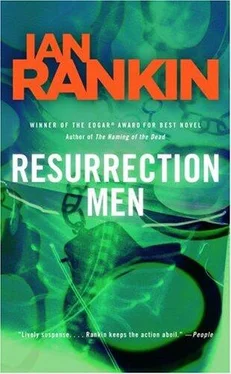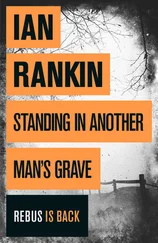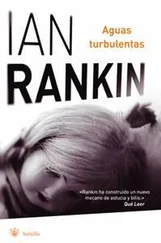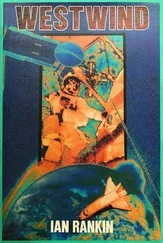All of which was just by way of filler, working up to the real story. “You know she’s dead?”
“Yes, ma’am.”
“Christ, Siobhan, no need for the formal stuff. It’s Gill here, remember?”
“Yes . . . Gill.”
Templer nodded. “You did what you could.”
“It wasn’t enough.”
“What were you supposed to do? Set up a blood transfusion on the pavement?” Templer sighed. “Sorry . . . that’s the middle of the night talking, not me.” She ran her hands through her hair. “Speaking of which, what were you doing down there?”
“I’d gone to warn her.”
“At that time of night?”
“Best time to find her at work, I thought.” Siobhan was answering the questions, but her mind was elsewhere. She was still on that street. The click of the lock on the sauna parlor door . . . the hand gripping her car for dear life.
Tsssk!
“Leith are handling it,” Templer said, unnecessarily. “They’ll want to talk to you.”
Siobhan nodded.
“Phyllida Hawes has gone to break the news.”
She nodded again. She was wondering if Donny Dow had bought the blade that same afternoon. There was a DIY store practically next door to St. Leonard’s . . .
“It was premeditated,” Siobhan stated. “I’ll say so in my report. No way that bastard’s getting off with manslaughter . . .”
Templer’s turn to nod. Siobhan knew what she was thinking: good lawyer behind him, Dow would push for manslaughter . . . a moment of madness . . . diminished responsibility. My client, Your Honor, had only just learned that his ex-wife, the woman charged with the care of his son, was not only a prostitute but that she was living in accommodation provided for her and the child by one of her clients. Faced with this revelation — a revelation made by police officers, no less — Mr. Dow fled from a police station and was allowed to roam free, the balance of his mind affected . . .
Dow would be lucky to serve six years.
“It was horrible,” she said, voice reduced to a whisper.
“Of course it was.” Templer reached out and took her hand, reminding Siobhan of Laura . . . Laura so alive, reaching out to touch her hand in the car . . .
A blunt knock at the door, and not even a wait to be asked to enter. Siobhan could see Templer readying to tear a strip off the intruder. It was Davie Hynds. He glanced at Siobhan, then fixed his eyes on Templer.
“Got him” was all he said.
Dow’s story was that he had given himself up, but the arresting officers were saying he’d resisted. Siobhan had said she wanted to see him. He was in one of the cells downstairs. They were waiting for him to be transferred to Leith, where the cells were ancient and the approximate temperature of a deep freeze all the year round. He’d been found at Tollcross. Looked like he was heading for the Morningside road: maybe planning to hike south out of the city. But then Siobhan remembered that Cafferty’s lettings agency was on that same stretch of road . . .
There was a knot of officers outside his cell door. They were laughing. Derek Linford was one of them. Linford was rubbing his knuckles as Siobhan approached. One of the uniforms unlocked the cell. She stood in the doorway. Dow sat on the concrete bed with head sunk into his chest. When he lifted it, she saw the bruising. Both eyes were almost closed.
“Looks like you did more than kick him in the nuts, Shiv,” Linford said, provoking more laughter. She turned to him.
“Don’t pretend you did this for me, ” she said. The laughter ceased, the smiles evaporating. “At best, I was the excuse. . .” Then she turned to face Dow. “But I hope it hurts. I hope it keeps on hurting. I hope you get cancer, you repellent little shit.”
The smiles were back in place, but she just walked past them . . .
They’d taken the Lexus. Gray knew Glasgow. Rebus could have driven them to Barlinnie: the famous Bar-L jail was on the Edinburgh side of town, just off the motorway. But Chib Kelly wasn’t in Barlinnie; he was under guard at a city-center hospital. He’d had a stroke, hence the urgency of their visit. If they wanted Chib Kelly cogent, the sooner they talked to him the better.
“He could be faking it,” Rebus said.
“He could,” Gray agreed.
Rebus was thinking of Cafferty and his miracle recovery from cancer. Cafferty’s story was that he was still being treated, albeit privately. Rebus knew it was a lie.
He’d woken early with someone thumping on his door. The Donny Dow story had already reached Tulliallan. Rebus had got on the mobile, trying first Siobhan’s home and then her own mobile. Recognizing his number, she’d picked up.
“You all right?” he’d asked.
“Bit tired.”
“Not hurt?”
“No bruises to report.” It was a good answer; it didn’t mean she wasn’t hurting in other ways.
“The rough stuff is supposed to be my job,” he’d chided her, keeping his voice light.
“You’re not here,” she’d reminded him, before saying good-bye.
Rebus looked out of his passenger-side window. Glasgow roads all looked the same to him. “I always get lost, driving round here,” he confessed to Gray.
“I’m like that in Edinburgh: all those bloody narrow streets, jinking this way and that.”
“It’s the one-way system here, gets me every time.”
“Easy once you know it.”
“You Glasgow-born, Francis?”
“The Lanarkshire coalfields, that’s where I’m from.”
“Fife coalfields me,” Rebus said with a smile, forging this new bond between them.
Gray just nodded. He was concentrating on the world beyond his windshield. “Jazz said there was something you wanted to talk about,” he said.
“I’m not sure.” Rebus hesitated. “Is that why you picked me for this trip?”
“Maybe.” Gray paused, seemed to be watching the scenery. “Anything you want to say, better be quick. Five minutes, we’ll be in the car park.”
“Maybe later,” Rebus said. Bait the hook, John. Make sure the point drives home.
Gray gave a half-shrug, as though he didn’t care.
The hospital was a tall modern building on the north side of the city. It looked to be ailing, stonework tarnished, windows clouded with condensation. The car park was full, but Gray stopped on a double yellow, placing a card next to the windshield stating he was a doctor on emergency call.
“Does that help?” Rebus asked.
“Sometimes.”
“Why not use a police sign?”
“Get real, John. People round here see a cop car, they’re likely to christen it with a half-brick.”
The admissions desk was next door to A&E. While Gray queued to find out Chib Kelly’s ward number, Rebus eyed the array of walking wounded. Cuts and bruises; down-and-outs nursing worlds made of shopping bags; sad-faced civilians for whom this was an experience devoutly to be forgotten. Teenage boys swaggered by in packs. They seemed to know each other, patrolled the aisles as though they owned the place. Rebus checked his watch: ten A.M. on a weekday.
“Imagine it at midnight on Saturday,” Gray said, seeming to read Rebus’s thoughts. “Chib’s on the third floor. Lifts are over here . . .”
The lifts opened onto a waiting area and the first person Rebus saw he recognized from the photos they had on file: Fenella, Rico Lomax’s widow.
She knew them for cops straight off, and was on her feet. “Tell them to let me see him!” she cried. “I’ve got my rights!”
Gray put a finger to his lips. “You have the right to remain silent,” he said. “Now behave yourself and we’ll see what we can do.”
“You’ve no business being here. My poor man’s had a heart attack.”
Читать дальше












